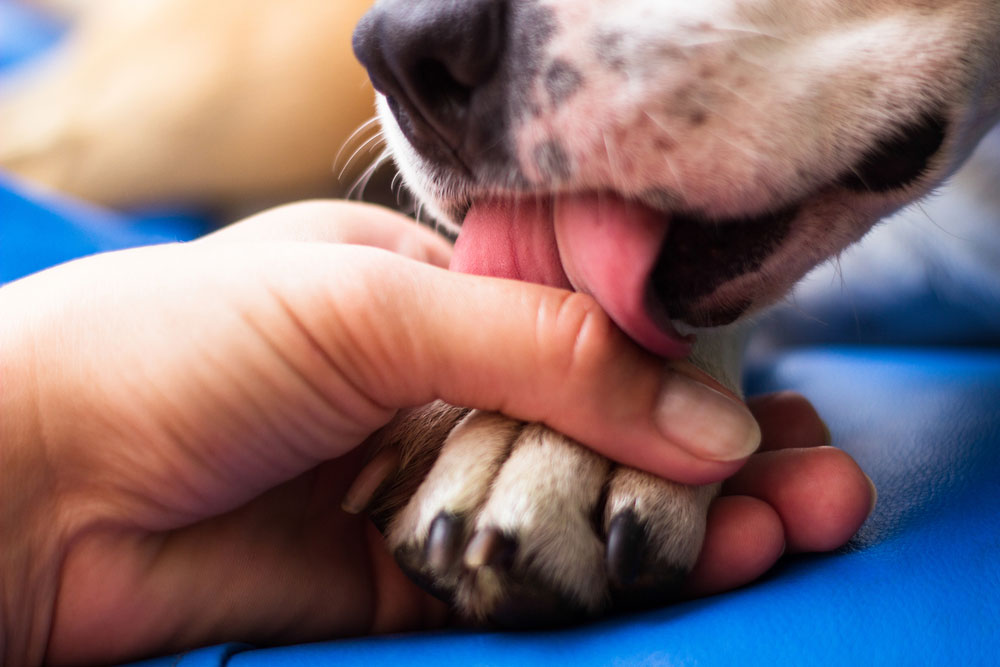It can be frustrating to watch dogs licking and chewing on their paws and legs, wreaking havoc on their skin and fur. We wonder why they do it and what to do about it. The team at Union Lake Veterinary Hospital provides you with insight into what’s going on and how to stop dogs from licking and chewing their paws (for everyone’s relief).
What Causes Chronic Paw Licking and Chewing?
In order to take steps to curb paw licking and chewing, you need to know why your dog is doing it. There are a few possible causes. In order to get an accurate diagnosis, it is best to call your veterinarian for an examination. Any symptoms or behaviors that are excessive signal an underlying health problem. Diagnostic testing and an exam will give us the answers to get your dog treated right away.
We understand, it is distressing to see your poor fur pal biting and licking himself excessively. Yet, there are four common factors that cause this reaction in pets.
- They have parasites – Fleas, ticks, and mites are all problem pests for dogs. Fleas especially cause chronic itching and discomfort, prompting your dog to bite and scratch. To assess your pet for fleas, look for their dropping (black dots on the skin) and flea nits or eggs, which appear as tiny white specks on the fur.
- They have allergies – This is the most likely cause of chronic paw licking and chewing by your pet. Allergies can be triggered by pollen, food, chemicals in the environment, and fleas. Flea allergies are especially common. Allergies manifest as itchy skin. Many pets with allergies will have a variety of skin conditions, from hot spots to bald patches. Consult with us on allergy testing and treatment if you suspect your dog has allergies.
- They have behavioral or emotional issues – Dogs, like humans, experience problems like anxiety, phobia, and depression. Biting and licking serve to alleviate stress, which can quickly turn into self-injury if it is a compulsion. Dogs who do not receive enough enrichment and exercise are prone to boredom and destructive behaviors. Certain phobias to noise or being left alone can also increase a dog’s desire to lick and chew at their skin.
- They have a medical problem – There are a variety of illnesses and conditions that can lead to dry, itchy skin. This includes thyroid disease, metabolic diseases like Cushing’s, kidney disease, nutritional deficiencies, and other underlying issues. This is why it is of the utmost importance to have your dog checked out to determine the root cause of their chronic paw licking and chewing.
There are a few additional possibilities such as a hormonal imbalance and due to underlying pain, but the triggers above are the most common and likely.
Tips to Stop Dogs from Licking and Chewing Their Paws
Once you determine the source of the problem, your veterinarian will recommend the most effective treatment to curb the behavior. You can also take some simple steps at home to decrease the paw licking/chewing problem.
- Follow your veterinarian’s treatment for any health condition, including parasite control, allergy treatment, medications, changes to diet, supplements, topical applications, and so on.
- Give your pet something to do by purchasing new toys and enrichment games and activities.
- Address any behavioral issues, such as noise anxiety, by reducing the triggers of stress and making use of pheromone sprays and diffusers, as well as calming treats.
- Redirect your pet from licking or chewing on their own skin by giving them a Kong toy, Nylabone, or other dental chew.
- Use physical deterrents, such as no-lick strips, E-collars, and booties to prevent your pet from continuing to lick or chew certain areas of the body.
When your poor pooch is dealing with chronic paw licking and chewing, chances are there is a medical reason. The good news is that ULVH can diagnose and start your pup on the right treatment to avoid hot spots, fur loss, and other skin conditions that come with this compulsion. To learn more about how to stop dogs from licking and chewing their paws, or to schedule an appointment, call us. We look forward to seeing you and your pet.

